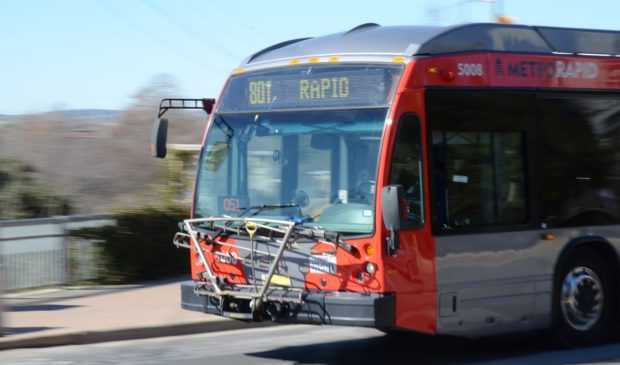Council approves ‘Smart Trips’ transit outreach
Tuesday, May 9, 2017 by
Jack Craver City Council voted Thursday to approve a contract with a Portland-based company to operate the “Smart Trips” program, which aims to get more people in the urban core to opt for public transit, bikes and walking over driving.
Before voting to pay Alta Planning & Design $600,000 (half of which comes from the Capital Metropolitan Transportation Authority) to run the program for two years, Council members debated whether such a program was a worthy use of limited transportation monies.
Alta will send out surveys to residents of a targeted area, inviting them to participate. Those who fill out the survey receive a visit from a staffer who brings them a variety of educational resources about transportation options. At the end of the program, participants take part in another survey to gauge whether they have changed their transportation behavior as a result.
Responding to complaints about funding an enterprise like this in a time of potential cuts to bus service, Council Member Pio Renteria emphasized that the city needed to figure out how to boost bus ridership if it hopes to preserve or expand service. The Smart Trips program, he said, will hopefully be part of the solution.
The transportation department ran an initial version of the program last year targeting neighborhoods in North Central Austin in conjunction with Capital Metro. The roughly 600 participants reported 3.3 percent fewer car trips at the end of the program.
The next incarnation of the program, which is currently being planned and will kick off in the fall, will target South Central Austin, although the city has yet to settle on which specific neighborhoods.
While managers in the city transportation department and Capital Metro will oversee the program, Alta will be responsible for hiring the temporary workers who will engage directly with those who respond to the survey.
Council Member Alison Alter said that she favored approving the 24-month contract, but encouraged Council to take a hard look at the results of the program before extending the contract further in the future. Council unanimously accepted an amendment she proposed to the contract requiring annual reports on behavioral changes attributed to the program, such as increases in bus ridership, as well as the cost per program participant.
“I see the potential, I’m not convinced by the pilots, so I want to make sure (there is) a clear way to be accountable for these dollars moving forward,” she said.
Alter also noted that under Connections 2025, an overhaul of city bus routes planned in the coming years, bus service in parts of her district will be reduced or cut. In that context, she suggested, the city needs to make sure that it’s spending its transit dollars wisely.
Council Member Ora Houston suggested the program didn’t produce enough of a return on investment.
“If you look at the cost per the decrease (in car use) that we receive, I’m not sure that this utilization of funds is the best way to do that,” she said.
Council Member Ellen Troxclair went a step further, saying that she was “concerned that it focuses transportation resources on areas that already have transportation options,” while her own southwestern district is comparatively lacking in transit access.
However, Council Member Jimmy Flannigan, whose northwestern district is largely suburban, defended the idea of a program aimed at Central Austin, saying that those outside the urban core benefit when those within it drive less and free up space on the roads for those commuting from farther away.
“It’s important to remember that the city as a whole is a transit system; it’s not 10 mini transit systems by district,” he said. “So even though this program is unlikely to ever come to my district, if I can get some more folks off of Burnet Road and onto a bus, it would benefit a lot of people in District 6 who work and play in those areas.”
Troxclair later clarified that she didn’t believe that every district should necessarily get the same amount of transit coverage, but that certain parts of the city have been persistently neglected in terms of transportation funding. She noted, for instance, that the $720 million mobility bond approved last year by voters will only provide her district with 0.1 miles of additional sidewalks.
“I have to be vocal about what I feel has been a pattern of underfunding in District 8 on transportation projects,” she said.
Council ultimately approved the program 8-2, with only Troxclair and Houston in dissent.
Photo by John Flynn.
The Austin Monitor’s work is made possible by donations from the community. Though our reporting covers donors from time to time, we are careful to keep business and editorial efforts separate while maintaining transparency. A complete list of donors is available here, and our code of ethics is explained here.
You're a community leader
And we’re honored you look to us for serious, in-depth news. You know a strong community needs local and dedicated watchdog reporting. We’re here for you and that won’t change. Now will you take the powerful next step and support our nonprofit news organization?









